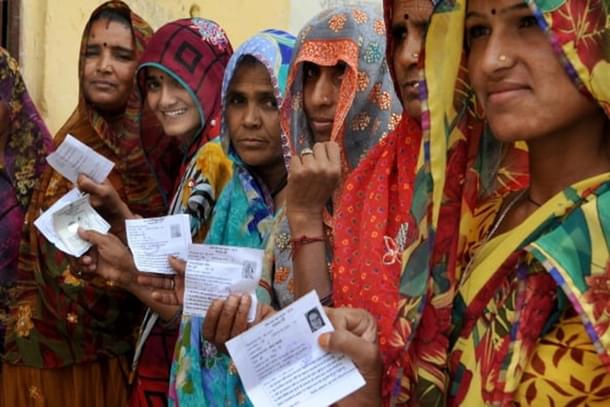Politics
BJP’s Resurgence In Assembly Elections Since Last June – Voters Undoing 2024’s ‘Mistakes’?
Nabaarun Barooah
Feb 09, 2025, 06:00 AM | Updated Feb 11, 2025, 01:09 PM IST
Save & read from anywhere!
Bookmark stories for easy access on any device or the Swarajya app.


The results of the 2025 Delhi Legislative Assembly elections brought the Bharatiya Janata Party back to power in the Assembly after a 27-year hiatus.
The election not only saw the BJP win throughout the national capital, getting a tally of 48, but also saw the uprooting of Aam Aadmi Party heavyweights Arvind Kejriwal and Manish Sisodia.
The victory is especially significant as it follows recent wins in Haryana and Maharashtra, both of which defied expectations.
Political analysts and psephologists have primarily attributed this resurgence to a combination of supply-side factors (party-centric): a localized campaign, superior cadre mobilization, the active support of the Rashtriya Swayamsevak Sangh, and promises of direct benefits and freebies.
These explanations, while valid, often miss a crucial demand-side factor – the collective mood of the electorate, shaped by a complex interplay of sentiments following the 2024 general elections.
The 2024 Lok Sabha results delivered a shock tothe ruling BJP. The party’s dramatic loss in several key states, while still securing a majority with allies, exposed an undercurrent of disillusionment.
The BJP’s aggressive campaigning, epitomized by the “400 Paar” slogan, led many of its core supporters to assume that the party’s victory was inevitable. The resulting complacency is taken to be one of the major reasons for a lower-than-expected voter turnout, with several traditional BJP voters not casting their ballots, assuming the party would win regardless.
This lack of participation was, in many ways, of the BJP’s own making. There was no perceptible overt anti-incumbency sentiment against Prime Minister Narendra Modi, but the election marked a subtle unraveling – an almost 2004-like moment when the BJP’s overconfidence and inability to connect with ground realities led to a lesser tally than anticipated.
However, soon after 4 June, 2024, a feeling of voters’ guilt and buyer’s remorse could be observed in the electorate. The “Modi wave” that had once seemed unstoppable appeared to have faltered, and many of those who had previously voted for the BJP now felt personally responsible for failing to preserve the party’s triumph. A sense that they had let down their belief in Modi’s leadership.
This regret possibly became the defining factor that shaped subsequent elections. In Haryana and Maharashtra, the BJP managed to regain its lost ground, defying the predictions of political analysts who had written off its prospects.
In Delhi, this national sentiment reached a fever pitch.
From a supply-side perspective, the BJP's recent campaigns have been highly localized.
—In Delhi, the party focused on pressing local issues such as clean air and the ongoing pollution of the Yamuna river.
—In Haryana, the BJP crafted the Lado Laxmi Yojana, a welfare programme designed to provide financial support to women by promising Rs 2,100 per month.
—Similarly, in Maharashtra, the party introduced the Ladki Bahin Yojana, another scheme offering Rs 2,100 per month to women.
These promises of direct benefits were designed to target key voter segments, ensuring that the party resonated with a broad range of issues faced by voters across regions.
But the BJP’s victory in Delhi is not merely a reflection of better campaigning strategies or more enticing promises. It’s the culmination of the Indian voter’s collective reckoning with the events of 2024.
The BJP’s loss that year ignited a fire to reclaim the ground it had momentarily lost. For many, this wasn’t just an election; it was a chance to correct what they saw as a momentary lapse in judgment.
This demand-side explanation likely offers a more profound insight into the current electoral trends. The Indian electorate’s response to 2024 wasn’t just about political shifts or strategic missteps by the opposition. It was about a psychological reset, a desire to fix the mistakes they thought had contributed to the 2024 setback. Voters in Delhi, much like their counterparts in Maharashtra and Haryana, sought to undo the mistakes of 2024, hoping that by voting the BJP back into power, they could restore the order and political stability they felt was momentarily lost.
This post-2024 electoral shift isn’t just about BJP’s promises of freebies or localised issues being addressed. It’s about the Indian voter seeking closure and correcting their perceived mistake.
The BJP’s triumph in Delhi, therefore, is a deeper reflection of how the voters – beyond the tactical and strategic considerations – are also emotionally-driven humans.
Nabaarun Barooah is an author and commentator.





